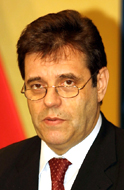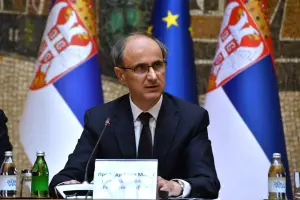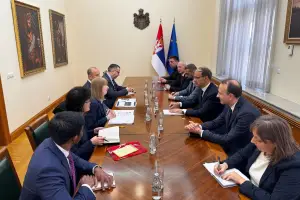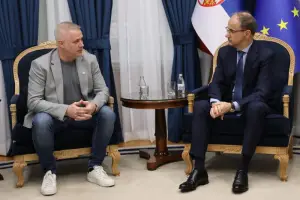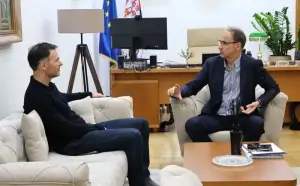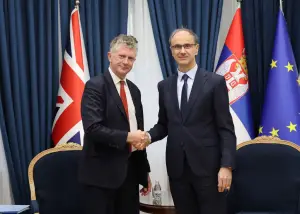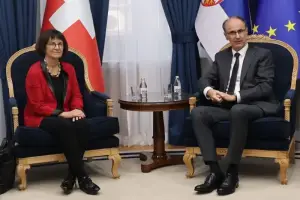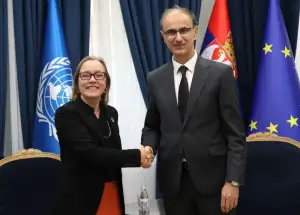Q:
A:
Prime Minister Kostunica held speech at 10th Thessaloniki Forum
25 May 2004
Serbian Prime Minister Vojislav Kostunica held a speech today at the 10th Thessaloniki Forum. This is the full text of the speech:
European future:
From the moment we accepted European partnership as a European Union's strategy for this territory, all of us who live here assumed a responsibility to act in three directions: first, to reconstruct our states in the terms of politics, economy and culture; second, to develop and deepen our relations and ties; and third, to do all this in the spirit of European integrations and together with the European Union. If the founding states of the European community managed to turn their bad past into good present and safe future by acting precisely in these three directions, then the countries of the southeastern Europe, especially the Western Balkan countries, must do the same.
Serbia and the state union of Serbia-Montenegro are located in the geographical centre of this region. Owing to that fact, this country can escape little that takes place in this region. It cannot do anything else but share both its good and its evil. If in the recent past it mostly shared its evil, because the major part of the region was caught in the worst form of social and political fighting, it is now ready to participate with its full strength in the overall reconstruction of the peaceful and prosperous environment on the entire territory. We know and feel that things are moving in that direction and we want to give our contribution. But, just as we know how to contribute to true European integration of the region, we are also aware of challenges and obstacles on that road. One of the major obstacles is further political and state disintegration. In other words, there still exists political will aimed at new division of territories, creating of new states and borders.
Serbia and the state union of Serbia-Montenegro are located in the geographical centre of this region. Owing to that fact, this country can escape little that takes place in this region. It cannot do anything else but share both its good and its evil. If in the recent past it mostly shared its evil, because the major part of the region was caught in the worst form of social and political fighting, it is now ready to participate with its full strength in the overall reconstruction of the peaceful and prosperous environment on the entire territory. We know and feel that things are moving in that direction and we want to give our contribution. But, just as we know how to contribute to true European integration of the region, we are also aware of challenges and obstacles on that road. One of the major obstacles is further political and state disintegration. In other words, there still exists political will aimed at new division of territories, creating of new states and borders.
Kosovo-Metohija:
It seems that the tendency of fragmentation of Balkan states has still not ended. It exists in its worst form of threat and ethnic violence. The events of March 17 and 18 are a clear proof of that. Definition of what happened on these dates, accepted by the international community, was not made by the Serbs, but by the highest-ranking members of the international military mission: the majority ethnic Albanians carried out ethnic cleansing against Serbs in Kosovo-Metohija. That ethnic cleansing was thoroughly planned and organised. Just as the whole international community perfectly understood what was going on in one part of Europe, it also understood the goal - creation of a new independent state in the Balkans.
What does this mean in the light of our discussion on the redefinition of roles and interests in southeastern Europe, and on the learning from the past and building of better future? That means to again sacrifice future for the sake of bad past, through wrong actions in the present. When I say "wrong actions", I refer to non-European, or better said anti-European, method of ruthless realisation of an equally non-European, or better said, anti-European goal, and that is the creation of a monoethnic state on a historically multiethnic territory. Will Europe and the international community let that happen? Frankly speaking, I am not sure of the positive or the negative answer. But, on this occasion, I can only point out shortly that the Serbian government and parliament offered a markedly European answer to this challenge, and that is an answer which is turned to the future, and not to the past. We offered a plan of institutional protection of Serb community in Kosovo-Metohija for the sake of protection of both the Serbs and the multiethnic Kosovo-Metohija.
Our Plan for Kosovo-Metohija is aimed at providing reliable protection of Serbs in the province under the international protectorate, but is also aimed at averting new dismembering of our state and the whole Balkan region. This second reason guides us in our joint effort with the European Union to preserve the state union of Serbia-Montenegro. Since Serbia has no historical disputes with Montenegro, but only ties which joins people of a state, we firmly believe that Serbia and Montenegro should remain a single actor of regional and European integration, both for our sake and for the sake of Europe. We have found a common language with the European Union on this issue, and we are gradually finding it with Montenegro.
What does this mean in the light of our discussion on the redefinition of roles and interests in southeastern Europe, and on the learning from the past and building of better future? That means to again sacrifice future for the sake of bad past, through wrong actions in the present. When I say "wrong actions", I refer to non-European, or better said anti-European, method of ruthless realisation of an equally non-European, or better said, anti-European goal, and that is the creation of a monoethnic state on a historically multiethnic territory. Will Europe and the international community let that happen? Frankly speaking, I am not sure of the positive or the negative answer. But, on this occasion, I can only point out shortly that the Serbian government and parliament offered a markedly European answer to this challenge, and that is an answer which is turned to the future, and not to the past. We offered a plan of institutional protection of Serb community in Kosovo-Metohija for the sake of protection of both the Serbs and the multiethnic Kosovo-Metohija.
Our Plan for Kosovo-Metohija is aimed at providing reliable protection of Serbs in the province under the international protectorate, but is also aimed at averting new dismembering of our state and the whole Balkan region. This second reason guides us in our joint effort with the European Union to preserve the state union of Serbia-Montenegro. Since Serbia has no historical disputes with Montenegro, but only ties which joins people of a state, we firmly believe that Serbia and Montenegro should remain a single actor of regional and European integration, both for our sake and for the sake of Europe. We have found a common language with the European Union on this issue, and we are gradually finding it with Montenegro.
Balkan state status quo:
As a country located in the very centre of the region, and multiethnic by its composition, the present-day Serbia fears a possible new retrograde movement. It fears that its social energy oriented towards European integration could become occupied by resurrected issues from the past - the issues of new division of states and borders. Therefore, Serbia is vitally interested in the Balkan state status quo, so that it could join forces with its neighbours to improve cooperation in all fields - trade, culture, security, human rights protection etc.
But Serbia is not capable of guaranteeing this status quo on its own. Faced with many problems of internal normalisation and stabilisation, it cannot be the leader of the policy of peace and security in the region. Any of its neighbours cannot do it alone either. Furthermore, all of them together cannot do it without European and international mediation. Shortly, the Balkans are still a European and world problem. Together with the European partnership strategy, it seeks new and more efficient security guarantees which would make this good strategy feasible and certain.
But Serbia is not capable of guaranteeing this status quo on its own. Faced with many problems of internal normalisation and stabilisation, it cannot be the leader of the policy of peace and security in the region. Any of its neighbours cannot do it alone either. Furthermore, all of them together cannot do it without European and international mediation. Shortly, the Balkans are still a European and world problem. Together with the European partnership strategy, it seeks new and more efficient security guarantees which would make this good strategy feasible and certain.

